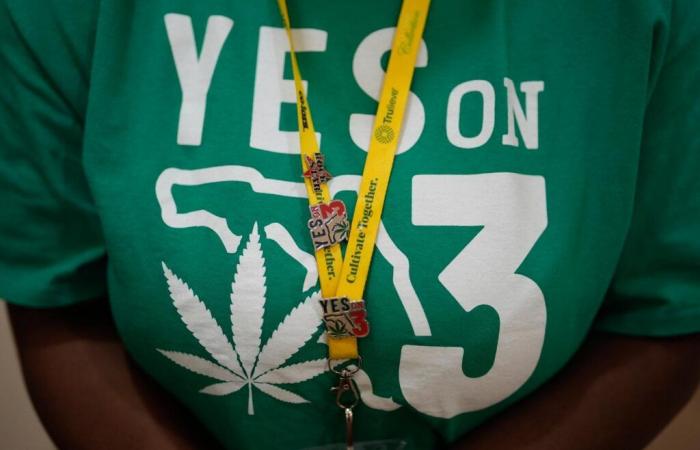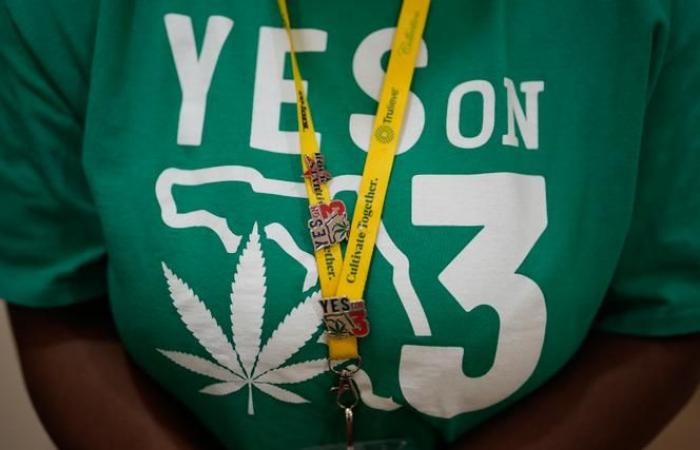For Americans, the choice was not just between Kamala Harris and Donald Trump (and the other small candidates). Nor to elect members of Congress and the House of Representatives. On Tuesday, November 5, some 140 local referendums on various themes – penal response, cannabis or even electoral boundaries – were submitted to the Americans, who also elected key figures such as governors, sheriffs and even mayors.
Follow our live | Results of the 2024 American election: Donald Trump becomes the 47th president of the United States, after his victory in Wisconsin; follow the reactions
Read later
Many of the proposed measures were initiated by petitions from citizens who wanted to bypass state legislatures, while others were put to voters by lawmakers.
• Reproductive rights
Voters were asked to vote on reproductive rights, a central issue during the presidential campaign and which has become specific to each state since the annulment of the federal decision Roe vs Wade by the Supreme Court, in June 2022. Out of ten states having called to decide, seven voted in favor of proposals strengthening the right to abortion (Arizona, Colorado, Maryland, Montana, Missouri, Nevada and New York), while three others, including Florida, rejected them.
Read also | American elections: the right to abortion was guaranteed in seven of the ten states where a referendum was held
Read later
Cannabis
The Florida spoke out against the legalization of recreational marijuana for people over 21. The Republican Party of Florida and Governor Ron DeSantis campaigned against it. Opposite, the largest supplier of medical marijuana in the state, Trulieve, had paid nearly 135 million euros to the Smart & Safe Florida political committee to campaign for “yes”. In 2016, Florida approved the legalization of medical marijuana.
Measures to legalize recreational marijuana were also under consideration in the North Dakota and the South Dakotatwo states won by the Republicans. They were ultimately rejected. In the Nebraskaother red state (a state won by the Republican Party), voters largely approved the legalization of medical marijuana and the regulation of its industry.
In the Massachusettswon by Kamala Harris, voters spoke out against the legalization of the cultivation, consumption and possession of natural psychedelics: psilocybin, psilocin, dimethyltryptamine. Among the 50 states and the District of Columbia, only Oregon and Colorado authorize them.
Before the election, more than half of Americans (53%), spread across 24 states and Washington DC, had legalized marijuana for adults. In total, 38 states and Washington DC had laws authorizing the medical use of marijuana.
Read the report (2021): Article reserved for our subscribers In New York, cannabis smells of revenge
Read later
Criminal response
The Californiaa historic Democratic stronghold, took a step towards toughening laws on drug use, ten years after having relaxed them, by voting for “proposition 36”: the criminalization of shoplifting for repeat offenders and he increased penalties for certain drug crimes, including those involving the synthetic opioid fentanyl. It also gives judges the power to order people convicted of drug use to undergo treatment.
The measure reverses in part a law voters passed in 2014 that downgraded several nonviolent crimes to misdemeanors, including thefts worth less than $950 (885 euros) and certain drug offenses.
Immigration
The voters of theArizona have ruled that it is an offense for an illegal person to apply for benefits or employment with false documentation, enter the state outside of legal ports of entry, and refuse to comply with orders to leave the United States. This measure authorizes local law enforcement to arrest violators and judges to order their expulsion.
In 2024, Republican lawmakers in Texas, Iowa and Oklahoma also passed immigration laws. In each case, federal courts have halted state efforts to enforce them. Arizona's measure won't take effect immediately because it says violators can't be prosecuted until a similar law in Texas or another state has been in effect for 60 consecutive days.
Read the article | Article reserved for our subscribers “Trump plays on this ancient fear of racial otherness for which white supremacism is the outlet”
Read later
The governors
Voters in 11 of the 50 states were called to elect their governor, a central political figure since he is the head of the executive at the federal level.
The World Application
The Morning of the World
Every morning, find our selection of 20 articles not to be missed
Download the app
Eight of those elections were won by Republicans: New Hampshire, Vermont, West Virginia, Indiana, Missouri, North Dakota, Montana and Utah. Three by Democrats: Washington State, Delaware and North Carolina.
Climate
Voters in the state of Washingtonlocated in the northwest of the country, are preparing to maintain a law on climate change aimed at reducing carbon pollution (62% of the ballots had been counted at the beginning of the afternoon). The vote defeated an attempt to repeal a 2021 state law that caps carbon emissions and requires big polluters to pay for the right to do so by purchasing “allowances.” Washington was the second state to launch a program of this type, after California.
Taxes
Another issue, national and local, submitted to voters: taxes. In the North Dakotaa proposal that would have eliminated most property taxes was rejected. A legislative group estimated the measure would have cost the state more than $3 billion over two years, or about half the general budget passed last year.
In theOregonvoters overwhelmingly rejected Measure 118 which would have increased the minimum tax on large businesses in order to finance a tax cut for residents. South Dakota voters have rejected a plan to repeal the sales tax on groceries.
In the ColoradoVoters are considering a proposal that would make the state the second, after California, to impose a tax on sales of firearms and ammunition, with revenues going primarily to crime victim services . The federal government already taxes gun and ammunition sales.
Electoral division
In theOhiovoters rejected an initiative that would have created a 15-member citizens' commission to redistrict U.S. House districts and state legislative seats. These would have required that the share of districts favoring each political party reflect the proportion of votes received in previous statewide elections.
Ohio's districts were created after the 2020 census by a commission of state officials, led by Republicans, and have been repeatedly found by courts to be unconstitutional and favoring Republicans.
Read the explanation | How “gerrymandering,” partisan redistricting, changes the outcome of an election
Read later
Voting methods
The voters of Connecticut adopted a measure authorizing postal voting without justification, thus joining most states, which already authorize it.
Ranked-choice voting received a mixed reception from voters. A measure authorizing this system was adopted in Washington DCas well as a system of semi-open primaries where voters not affiliated with a party will still be able to take part in the primary ballot. But in theOregonvoters rejected a proposal that would have required ranked-choice voting for primary and general elections. THE Missouri approved a measure banning voting in order of preference.
Ranked-choice voting is currently used in Alaska and Maine. However, in Alaskathe repeal of the provisions of a 2020 initiative which establishes open primaries and general elections with choice in order of preference, prevailed at first glance, Wednesday November 6 at midday, while 25% of the ballots have not yet been analyzed.
The voters of theIdaho a you Nevada rejected proposals to establish open primaries bringing together candidates from all parties, with a number of them advancing to the general election through ranked-choice voting. In the South Dakotavoters rejected a measure to create open primary elections in which candidates from all parties would appear on the same ballot.
Read the explanation | Understand everything about the nomination of candidates for the 2024 American presidential election
Read later







